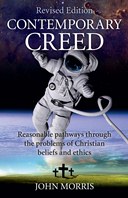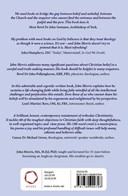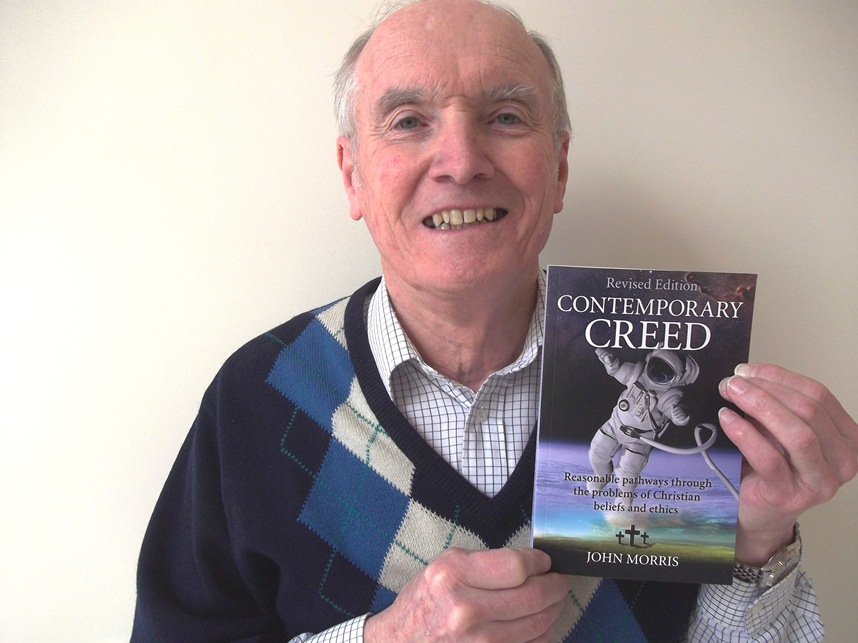
 Unlike Richard Dawkins, Contemporary Creed (revised edition) sees no conflict between evolution and God, faith and modern science. But what sort of God creates a violent universe with a Big Bang almost 14 billion years ago and appears to do little or nothing to prevent built-in suffering & natural disasters like earthquakes, famines, disabled children and cancers? The Christian God leaves a lot unexplained. Some writers give superficial answers whereas Morris, who helps care for his own handicapped grandson, gets to the root of difficulties and succeeds in finding credible pathways through sixty problems of Christian beliefs and ethics.
He writes for believers and unbelievers: for Christians like himself who admit their doubts, and for atheists and agnostics interested in big questions. His unusual format of 90% prose and 10% original poetry is entertaining, and the style straightforward everyday language, offering conclusions that are often open-ended, undogmatic. His systematic theology becomes a brief A-Z that may be read in any order for individual Bible study, or by house groups that want a provocative structure for lively discussion. Unlike Richard Dawkins, Contemporary Creed (revised edition) sees no conflict between evolution and God, faith and modern science. But what sort of God creates a violent universe with a Big Bang almost 14 billion years ago and appears to do little or nothing to prevent built-in suffering & natural disasters like earthquakes, famines, disabled children and cancers? The Christian God leaves a lot unexplained. Some writers give superficial answers whereas Morris, who helps care for his own handicapped grandson, gets to the root of difficulties and succeeds in finding credible pathways through sixty problems of Christian beliefs and ethics.
He writes for believers and unbelievers: for Christians like himself who admit their doubts, and for atheists and agnostics interested in big questions. His unusual format of 90% prose and 10% original poetry is entertaining, and the style straightforward everyday language, offering conclusions that are often open-ended, undogmatic. His systematic theology becomes a brief A-Z that may be read in any order for individual Bible study, or by house groups that want a provocative structure for lively discussion.
|
| Content of First Edition 2005 :  Contemporary Creed translates ancient beliefs into today’s language. It is written for those who, like the author, do not find it easy to believe and whose faith is married to doubt, but he points an intelligent pathway through sixty intellectual problems of traditional Christian beliefs. A library of theology books is compressed into this novel and popular mini-course on modern Christianity, in transparent English, without jargon. Original verse helps animates old truths and solve their difficulties. Contemporary Creed translates ancient beliefs into today’s language. It is written for those who, like the author, do not find it easy to believe and whose faith is married to doubt, but he points an intelligent pathway through sixty intellectual problems of traditional Christian beliefs. A library of theology books is compressed into this novel and popular mini-course on modern Christianity, in transparent English, without jargon. Original verse helps animates old truths and solve their difficulties. |
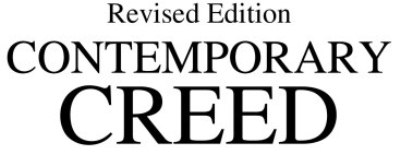
A MULTI-PURPOSE BOOK
The Revised Edition (RECC) is intended to be more multi-purpose than the lst edition (CC) and readers probably find themselves in more than one of the following dozen situations:
- Non-Christians, whether atheists, agnostics, humanists, or believers in other religions. RECC is a reasoned reply to Richard Dawkins: The God Delusion, agreeing with almost all of his evolutionary biology but disagreeing with most of what he builds upon it.
- Crises: Cancer, terminal illness, bereavement, natural disasters.
- Christians with doubts.
- Healing the past: finding forgiveness and escaping bitterness.
- Clergy wanting innovative resources for sermon preparation and creative ministry and mission.
- House groups.
- Individual Bible study and daily prayer.
- Confirmation and baptism classes.
- Lent, Easter, Retreats.
- EDUCATION: School Religious Education: teachers, teacher-trainers, and trainee-teachers, wanting a novel resource for RE teaching.
- EDUCATION: Theological colleges and seminaries for training clergy, ministers, readers and leaders.
- EDUCATION: University students of theology, philosophy, ethics and religion.
1. NON-CHRISTIANS: the spaceman on the book’s cover embodies contemporary science and contemporary faith, exploring the cosmos for new knowledge, truth and meaning.
Sceptics will find in RECC not a preacher’s sermon but a rational debate. It argues that the Christian God is a reasonable hypothesis on which to base one’s life, worth examining by readers in China, India, and Africa (including Uganda where John Morris worked for 9 years). So other world religions are included in RECC.
All humans are spiritual at heart, searching for meaning, trying to make sense of life. RECC is a journey of discovery, as its author admits uncertainties. He writes not in church jargon but in plain language, having used it all his working life, before he became an unpaid clergyman aged 58.
RECC offers dialogue not dogma. It looks both ways, at the reasonableness of belief and unbelief, at the probability of God not watertight certainties, at God-clues not God proofs. Those Christians who feel unable to talk about their faith (perhaps to friends, or their own children who have abandoned churchgoing) might want to buy RECC as a present to give away, let RECC do the talking for them in an unthreatening way, not pretending to know all the answers. One reviewer wrote:
RECC made me think...it is worth giving away!
2. CRISES: Cancer, terminal illness, bereavement, natural disasters. The problem of suffering is the principal reason why many people remain atheists or abandon their faith, unconvinced by the often shallow explanations offered by Christian writers. So this problem is central to RECC which says far more than CC about Daniel, the author's own profoundly handicapped grandson. Also see pp 176 - 183 "Titanic" and "Mayday".
3. CHRISTIANS WITH DOUBTS: (especially "Wobblers" pp170,171). Doubting Thomases want evidence, so RECC supplies it in tentative "God-clues" (listed p19 point 3), building up a reasonable creed, bit by bit.
4. HEALING THE PAST: finding forgiveness and escaping bitterness. Forgiveness is central to Christianity and RECC yet all humans find it difficult, John included. "Backpackers" and "High Earners" (pp188-191) describe how closure might be attempted within families and inside prisons where convicts struggle with their past and their victims wrestle with forgiveness, perhaps feeling that it is not moral to forgive when the offender shows no remorse. Five ways are suggested whereby an offender might begin to earn forgiveness. The South African Truth and Reconciliation Commission has lessons for other places of historic conflict (Northern Ireland, Rwanda, Palestine, etc) to break the cycle of tit-for-tat retaliation. See also "Ethics for everyone" pp54-74.
5. CLERGY wanting innovative resources for sermon preparation, and creative ministry and mission. Besides ministry to believers, RECC can help with mission or outreach to non-Christians, providing reasoned apologetics not forceful evangelism. The 60 chapters do not preach and are not ready-made sermons but they are a springboard with some novel ideas, perhaps forming the framework for a series of sermons, and saving time hunting for references, because RECC is an all-in-one volume.
6. HOUSE GROUPS. Alpha is good for starters; RECC is for those who want a heavier main course. Some groups want a structure for provocative discussion over several months eg. “Ethics for everyone” pp54-74. Others want a systematic A-Z course for progressive study over a year or two. But all 60 chapters are self-contained, so RECC can be read in any order, allowing groups to start anywhere that is relevant to the group’s lives. No expert needs to be present, because RECC is self-sufficient.
7. INDIVIDUAL BIBLE STUDY AND DAILY PRAYER. As a change from BRF or SU daily Bible notes, RECC gives plentiful references for quiet times and helps Christians become more theologically literate.
8. CONFIRMATION and BAPTISM classes. CC is used by some clergy as an unusual confirmation course. RECC’s expanded commentary will do that better and maybe solve a familiar problem for relatives: “What do I buy for his/her confirmation present?”.
9. LENT, EASTER, Retreats. CC has been used in the USA and UK on these occasions, offering a choice of pieces from the sections on “The death of Jesus and the atonement”, and “The resurrection of Jesus”.
10. EDUCATION - SCHOOL RELIGIOUS EDUCATION: R.E. teachers, teacher-trainers and trainee-teachers wanting a novel resource for RE teaching. Barbara Wintersgill, HM Inspector for RE in the UK, wrote of "weaknesses in teachers' subject knowledge", gaps that RECC helps fill, if it becomes a kind of sat-nav. or mobile phonetext of problem-solving ideas. It covers part of the high school secondary curriculum in a novel way, each chapter starting with an intellectual problem that intelligent students ask, and not pretending that there is always a complete answer. So some issues are left open-ended, giving space for mystery and the reader's own creative thinking. With 60 chapters of lesson material, teachers can adapt them to suit their classes, to provoke lively discussion and creative writing. Inter-faith connections are made throughout and especially at the end.
11. EDUCATION - THEOLOGICAL COLLEGES and seminaries for training clergy, ministers, readers and leaders. RECC offers both systematic theology and apologetics. It can be a handy Wikipedia, an A-Z overview of many books on long reading lists, saving time, without skirting the intellectual difficulties. It is mostly mainstream, middle-of-the-road theology, some of it liberal, some conservative.
12. EDUCATION - UNIVERSITIES for students of theology, philosophy, ethics and religion. Before reading CC, one lecturer asked: "Is your popular theology going to be of sufficient depth for university purposes?" . RECC goes deeper, yet this weightier book can be read - like any other book - at different levels. So some readers will find it plain sailing whereas an American PhD priest wrote: "It is not a book to be whizzed through but to be given the thought it clearly deserves. I find most interesting your wonderfully clear exposition of some pretty sophisticated theological & scriptural issues. For instance, your use of process theology early on."
AUTHOR: John Morris, MA, M.Ed, PGCE, PhD, was a teacher and lecturer for over thirty years before being ordained as an unpaid Anglican clergyman in 1995. |
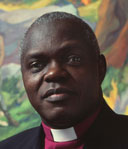
Back Cover Endorsements
 We need books to bridge the gap between belief and unbelief, between the Church and the enquirer who cannot find the entrance and, for that matter, between the pulpit and the pew. This book does it... John Morris taught me when I was a young man ... (see p14 for full text) We need books to bridge the gap between belief and unbelief, between the Church and the enquirer who cannot find the entrance and, for that matter, between the pulpit and the pew. This book does it... John Morris taught me when I was a young man ... (see p14 for full text) |
 My problem with most books on God by believers is that they treat theology as though it were a science. It's not - and John Morris doesn't try to pretend that it is . Most refreshing! My problem with most books on God by believers is that they treat theology as though it were a science. It's not - and John Morris doesn't try to pretend that it is . Most refreshing! |
 John Morris addresses many significant questions about Christina belief in a careful and truth-seeking manner. His book should be helpful to many enquirers. John Morris addresses many significant questions about Christina belief in a careful and truth-seeking manner. His book should be helpful to many enquirers. |
 In this admirable and cogently-written book, John Morris explains how he sustains a life-changing faith while being fully mindful of all the intellectual challenges and preplexities this entails. Even those of us who cannot share his beliefs will be stimulated by his arguments and enlightened by his perspective. In this admirable and cogently-written book, John Morris explains how he sustains a life-changing faith while being fully mindful of all the intellectual challenges and preplexities this entails. Even those of us who cannot share his beliefs will be stimulated by his arguments and enlightened by his perspective. |
 A brilliant, honest, contemporary restatement of orthodox Christianity. It tackles 60 of the toughest objections to Christian faith with deep thoughtfulness, in well-organised topics and clear prose. His 100-word creed is a masterpiece, his poems a joy, and his profound handling of difficult issues will help many, atheists and believers alike. A brilliant, honest, contemporary restatement of orthodox Christianity. It tackles 60 of the toughest objections to Christian faith with deep thoughtfulness, in well-organised topics and clear prose. His 100-word creed is a masterpiece, his poems a joy, and his profound handling of difficult issues will help many, atheists and believers alike. |
|
Equipment for Disabled Children Friends of Albella Boys Home, Darjeeling |
Home | Purpose of the Book | Reviews of the Book | Free Read of the Book | To Buy the Book
New Book Suffering | Biography of author | Articles by John Morris
